
As Human Resource professionals, staying informed about the latest developments in employee benefits and contributions is essential. One area that has garnered significant attention in recent years is Employment-related Securities National Insurance Contributions (ERS NI). This aspect of National Insurance is often overlooked, yet it plays a crucial role in both employee entitlements and employer obligations. In this article, we will delve into what ERS NI is, its significance, current trends, and the benefits it entails for both employees and employers.
What is ERS NI?
Employment-related Securities (ERS) National Insurance Contributions, commonly referred to as ERS NI or Class 1 NICs for ERS, pertain to the contributions levied on income derived from various employment-related benefits. These benefits typically include stock options, shares, and other forms of earnings that employees may receive in addition to their regular wages. As such, it is essential for HR professionals to understand the implications of ERS NI on both sides of the employment relationship.
Significance of ERS NI
Income from ERS constitutes earnings from an employed earner’s occupation. Thus, it is subject to earnings-related National Insurance contributions (NICs), similar to regular wages. The importance of these contributions cannot be overstated; they are vital for funding the UK’s social security system, including state pensions and various other benefits. Employees who receive income from ERS must pay Class 1 NICs, ensuring that their additional earnings do not exempt them from contributing to these vital services.
Current Trends in ERS NI
The regulations governing ERS NI have evolved over the years, adapting to the changing landscape of employment-related benefits and the needs of a dynamic workforce. Various legislative measures, including the Social Security (Contributions) Regulations 2001 and the Social Security (Miscellaneous Amendments No. 2) Regulations 2015, have outlined specific guidelines for calculating these contributions. One notable aspect of these regulations is the effort to prevent double charging and to align with international NIC norms, particularly for internationally mobile employees (IMEs) (Source).
Key Benefits of ERS NI
Benefits to Employees
Paying Class 1 NICs on income received from ERS can significantly impact an employee’s entitlement to state benefits, including the State Pension. This is crucial for maintaining equity among workers who receive varied income sources. By ensuring that contributions are made on ERS income, employees do not find themselves at a disadvantage compared to their peers who rely solely on regular wages (Source).
Benefits to Employers
Employers, too, have a vested interest in the ERS NI framework. They are required to contribute to NICs, thus supporting the broader social services that employees rely upon, such as the National Health Service and unemployment benefits (Source). By ensuring compliance with ERS NI regulations, employers not only safeguard their organisations from potential penalties but also foster a culture of fair contribution to the societal ecosystem that supports their workforce.
Understanding ERS NI Compliance
Compliance with ERS NI regulations can seem challenging, particularly given the nuances involved in calculating contributions on various income types. However, by implementing a systematic approach, HR professionals can streamline this process. Here are some essential steps for ensuring compliance:
- Stay Informed: Regularly update yourself on the latest legislative changes regarding ERS NI to become aware of any new obligations or adjustments that may affect calculations.
- Educate Employees: It is crucial to inform employees about how ERS NI works and its implications on their net income and future benefits.
- Integrate Technology: Utilising payroll software that accommodates ERS NI calculations can help ensure accuracy and efficiency in payroll processing.
- Conduct Audits: Periodic reviews of employee records and benefit distributions can detect discrepancies or errors and ensure compliance.
The Future of ERS NI
As the workforce continues to evolve with increasing trends in remote work, gig employment, and flexible compensation models, the future of ERS NI may see further adaptations to remain relevant and fair. Human Resource professionals must anticipate potential shifts and be prepared to adjust practices accordingly. This may involve advocating for policy changes that reflect the realities of modern employment patterns, especially concerning internationally mobile employees.
Conclusion
ERS NI is a critical aspect of the UK’s National Insurance framework that significantly impacts both employees and employers. For employees, paying Class 1 NICs on ERS income ensures entitlement to vital social benefits. For employers, compliance contributes to the resilience of the nation’s social safety net, which, in turn, supports their workforce. By staying informed and proactive in the face of evolving regulations, HR professionals can successfully navigate the intricacies of ERS NI, promoting fairness and compliance throughout their organisations.
With the right strategies in place, both employees and employers can thrive within the ERS NI system, ensuring that each party meets its obligations while benefiting from the protections and services that come with those contributions. As HR professionals, your role in fostering understanding and compliance around ERS NI is paramount in creating a supportive work environment that looks after the welfare of all employees.
Vadim Kouznetsov is a distinguished entrepreneur and the visionary founder and CEO of JobXDubai.com, the UAE’s rapidly expanding job board. Renowned for his expertise in bridging the gap between job seekers and employment opportunities, Vadim has become a leading authority in the recruitment and job market of Dubai.
